The keto diet is so vastly different from most dietary patterns that many people are concerned about its impact on our health.
After decades of being told how bad high-fat diets are for us, it may seem like the high-fat, low-carb keto diet would be the most harmful and least healthy diet that one can possibly follow. However, the research on the keto diet reveals a different story.
The severity of heart disease, type 2 diabetes, and obesity, for example, can all be reduced by cutting the carbs and increasing fat intake. Even if you aren’t at risk for these three common conditions, the keto diet can still be healthy for you because it can promote better body composition, increase your micronutrient intake, and improve your overall health and energy levels.
However, as with any other diet, the keto diet can also be unhealthy if implemented incorrectly or by someone who doesn’t fare well with high fat, low carb diets. This is why we must take the question that led you here — “is the keto diet healthy?” — one step further to find out if keto is healthy for YOU.
What Is the Keto Diet?
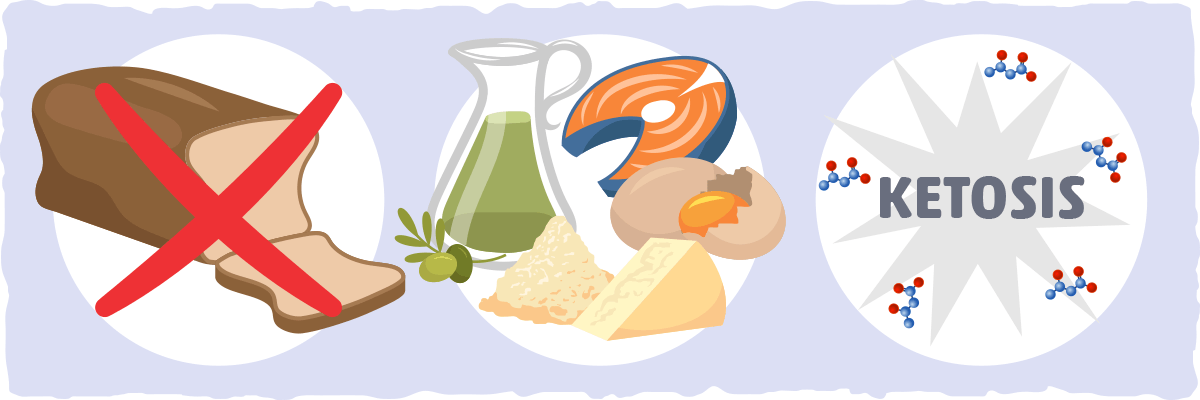
In essence, the keto diet is the only diet that restricts carbs with the intention of promoting sustained ketosis.
Most cells prefer to use blood sugar, which comes from carbohydrates, as their primary source of energy. In the absence of dietary carbs, we start breaking down stored fat and dietary fat into molecules called ketone bodies (the metabolic process responsible for this is called ketogenesis).
Once you reach ketosis, the percentage of cells that use ketones for fuel will increase and ketone production will increase until you start eating carbohydrates again. The shift from sugar burning to ketosis usually happens over two to four days of eating fewer than 35 grams of carbohydrates per day.
Keep in mind, however, that this is a highly individualized process, and some people need a more restricted diet to start producing enough ketones to enter ketosis.
To limit carb consumption to such a large extent, you must eat plenty of keto-friendly foods like fatty meats, eggs, sausages, cheeses, fish, nuts, butter, oils, seeds, and low carb vegetables. This is in stark contrast to the typical American diet which consists of at least 50% carbs, preventing people from entering into ketosis and reaping its energy-boosting and hunger-busting benefits.
However, the fact that the keto diet is so different from what most of us eat raises many questions as to how it affects our bodies. Is a high-fat diet that promotes ketosis be healthy?
Is the Keto Diet Healthy?

The first research done on the keto diet was with children who had epilepsy. In fact, this ketosis-promoting diet was explicitly designed to help these children.
What did the researchers find? In general, the studies indicate that a well-formulated keto diet is safe and effective for children who have epilepsy.
With that being said, the majority of people that come across keto are looking to lose weight, so let’s see if this dietary strategy can promote healthy weight loss.
According to the current research literature, the high-fat, low-carb diet can promote faster weight loss compared to a more traditional low-fat diet, or even a Mediterranean diet. However, the difference in weight loss seems to disappear over time.
Also worth noting is the impact that keto has on other health markers. Triglycerides, cholesterol, blood sugar, A1c, and blood pressure, for example, have all been found to decrease as a result of cutting the carbs. However, most of the studies last no longer than six months.
The only evidence I could find for the long-term health effects of a keto diet is from one 12 month trial. As a result of the study, the researchers found that overweight adults with elevated A1c that were assigned to a keto diet experienced more significant reductions in A1c, lost more weight, and decreased their medications more than those instructed to follow a moderate-carbohydrate, calorie-restricted, low-fat diet.
For info on the health effects of keto for longer than one year, we must look to success stories and case studies, which show a plethora of people that have stayed on keto for a few years to decades without any health issues.
If you’d like to take a closer look at the research on how keto is healthy and helpful for specific conditions, check out the article that is relevant to your situation:
- Epilepsy
- Type 2 Diabetes
- Type 1 Diabetes
- High Blood Pressure
- Alzheimer’s disease
- Parkinson’s disease
- High Blood Sugar Levels
- Overweight/Obesity
- Heart Disease
- Polycystic Ovary Syndrome
- Fatty Liver Disease
- Cancer
- Acne
- Autism Spectrum Disorder
- Gout
Long story short, the answer is yes — the keto diet is healthy. There is, however, one crucial caveat we must address regarding diets in general: Just because a diet works well for someone else doesn’t mean it will work for you.
Regardless of what diet you follow, it will not be healthy unless it is formulated in a way that meets your needs.
How to Know If Your Diet Is Healthy
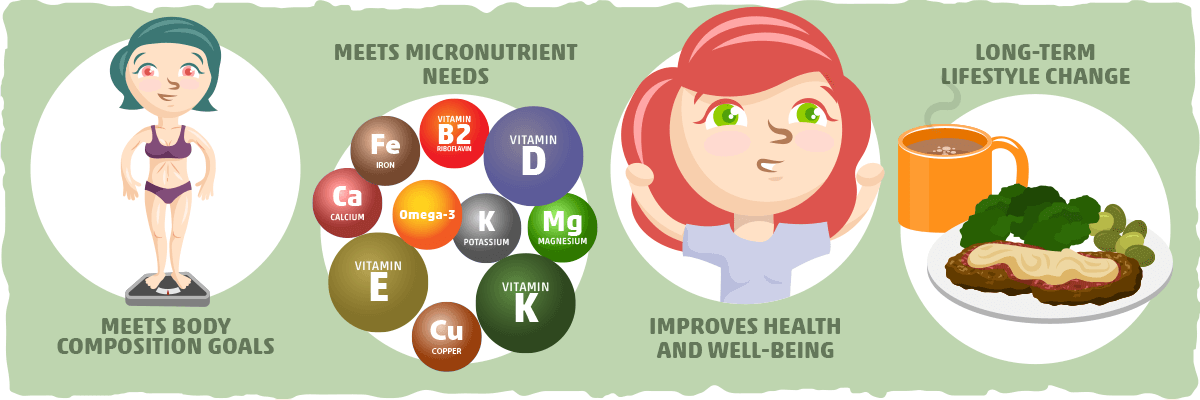
To figure out how healthy your diet is for you, you must make sure it does these four things for you:
- It helps you meet your body composition goals. Let’s face it; if you aren’t getting the results you want, you need to switch things up. When it comes to losing weight, you will have to make changes that help you maintain a calorie deficit.
- It meets your micronutrient needs. It is crucial that your diet provides you with the vitamins and minerals you need to maintain optimal health and stave off disease. Although you can lose weight without meeting your micronutrient needs, you will not feel your best while doing so.
- It improves your overall health and wellbeing. A healthy diet will make you feel good and “healthy” while it optimizes objective health measures like your body composition and blood work. If your diet is impairing your quality of life and causing an unnecessary amount of stress and suffering, then you should make adjusts to your diet. With that being said, even if you feel great, your blood tests can still indicate that you are worsening your health. This is why it is essential to track your subjective experience as well as objective results such as your weight, waist circumference, blood sugar, cholesterol levels, etc.
- It provides you with a dietary approach you can use to sustain your results, health, and well-being for the long term. Any diet can provide you with short-term results, but will it help you maintain your new body indefinitely? The best diet is a diet that completely replaces your previous way of eating while it meets the other three criteria on this list. If you can’t envision yourself sticking to the diet for the long-term and you are struggling to follow it in the short term, then you will probably rebound to your old habits and gain the weight back.
If your diet doesn’t meet these four criteria — regardless of how much you restrict carbs or how many ketones you produce — your health will suffer in some way or another, mentally, physically, and/or emotionally. To find out exactly what an optimal diet will be like for you, you must experiment with different approaches to find out what dietary strategies will help you achieve your goals, improve your health, and sustain your results.
As an example, let’s apply what we’ve just learned to the keto diet, and learn how to create a well-formulated keto-friendly way of life.
How to Formulate Your Keto Diet for Healthy and Sustainable Weight Loss
The number one reason why most people start dieting is to lose fat, and keto is highly effective at helping people do this better than most diets.
However, just because a diet helps you lose weight doesn’t mean it is healthy for you. There is a healthy and harmful way to reach your goals, even if you are following the keto diet.
How do you know if you are losing weight in a healthy way? Make sure you are following these weight loss principles:
- Maintain a calorie deficit of 35% or lower. By eating fewer calories than your body needs to maintain its weight (i.e., sustaining a calorie deficit), you will lose weight. However, if your calorie deficit is above 35%, you will increase your likelihood of experiencing more hunger, slowing your metabolic rate, and regaining the weight you lost when you aren’t dieting.
- Lose weight at a rate of 1 to 2 pounds per week. The current research indicates that this is the gold standard rate for healthy weight loss. This is because it increases the chances that you will be able to keep the weight off for the long-term without fighting against cravings and hunger.
- Eat enough protein. Even if you are not lifting weights, eating enough protein is crucial to your keto diet success. When you meet your protein needs, you will reduce your hunger levels, burn more calories, and help preserve muscle mass, all of which will help you lose more weight while looking and feeling healthier.
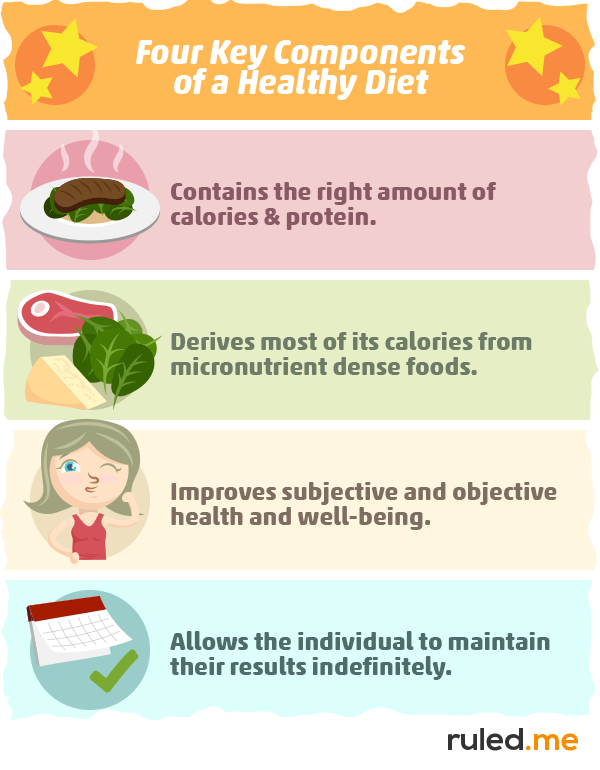
The simplest way to figure out how much you need to eat on keto is using our keto calculator. You can also use a calorie tracking app like MyFitnessPal or Cronometer and our guide to calorie tracking on keto to help you stick to your diet.
However, even if you meet your calorie and protein needs precisely, you may still be deficient in specific nutrients that are essential for maintaining overall health while you lose weight. Let’s take a closer look at these nutrients in the next section.
How to Meet Your Vitamin and Mineral Needs with Keto to Optimize Health
Although the keto diet cuts out carb-laden foods that serve as good sources of vitamins and minerals, it is still relatively easy to meet your micronutrient needs with keto foods. The key to doing this, as with any other diet, is by having a variety of different whole foods. Anytime you eat the same foods over and over again, you run the risk of being deficient in the nutrients that those foods are lacking.
While you are on the keto diet, make sure you are eating a diverse array of keto-friendly meats, poultry, seafood, dairy, eggs, and veggies. Some of the most micronutrient dense keto foods are eggs, low-carb vegetables, seafood, and organ meats like beef liver.
If you are looking to be more precise with your vitamin and mineral intake, here are some of the most common micronutrients that keto dieters struggle to get enough of:
- Biotin. You can increase your biotin intake by eating high-fat, low carb dairy products, meat, poultry, nuts, and green leafy vegetables
- Iodine. You can meet your iodine needs by eating keto foods like seaweed, shellfish, and fatty fish.
- Potassium. You can increase your potassium intake by eating keto foods such as green leafy vegetables, tomato, avocado, and nuts.
- Magnesium. You can increase your magnesium intake by eating leafy green vegetables, nuts, avocado, and meat.
- Sodium. You can meet your sodium needs by increasing your table salt, fermented foods, fish, shellfish, and/or seaweed intake.
- Vitamin E. You can increase your vitamin E intake by eating keto foods like nuts, avocado, green leafy vegetables, and organ meats.
- Vitamin D. You can increase your vitamin D intake by consuming more fatty fish, eggs, organ meats, and/or cod liver oil. (And don’t forget to get plenty of sunlight.)
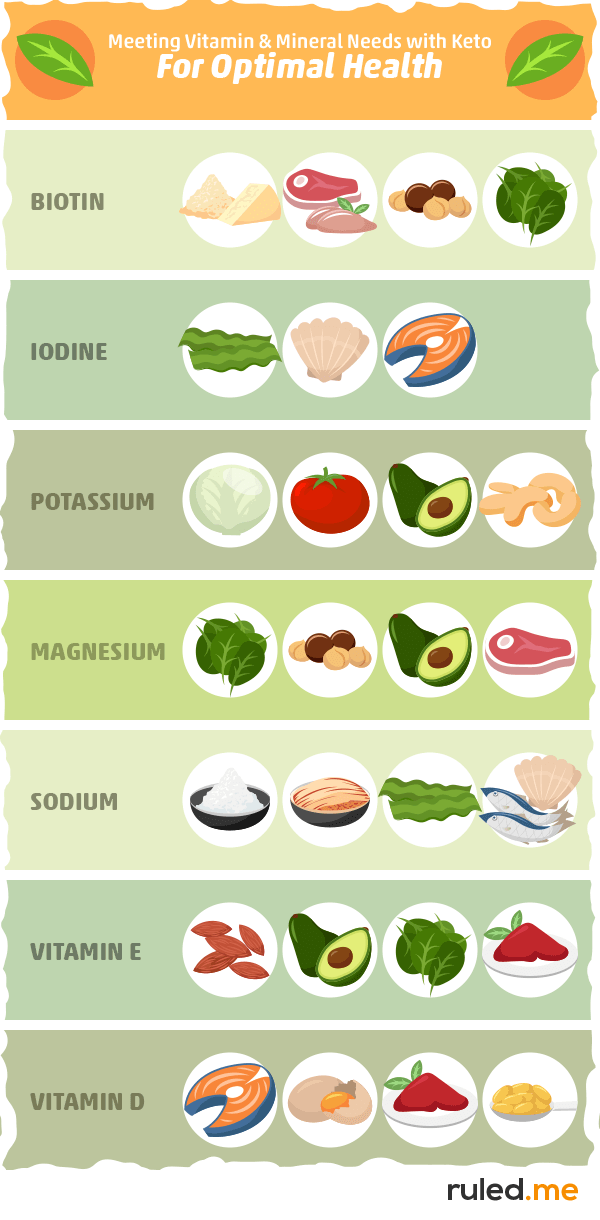
For more specific information on how to meet your vitamin and mineral needs while you are on the keto diet, check out our comprehensive guide to micronutrients. In this guide, you will find out how to meet your micronutrient needs with keto foods and how to track your intake.
With that being said, as long as you are eating a wide variety of keto-friendly foods throughout the week, you will probably be close enough to meeting all of your micronutrient needs.
Once you are eating roughly the right amount of micronutrients and macronutrients, you will be on the fast track to the results you want. However, even if you formulated your keto diet flawlessly, you may still run into other issues that can make what you thought was a healthy diet into a harmful lifestyle change.
How to Know If Keto Is Improving Your Overall Health and Well-being
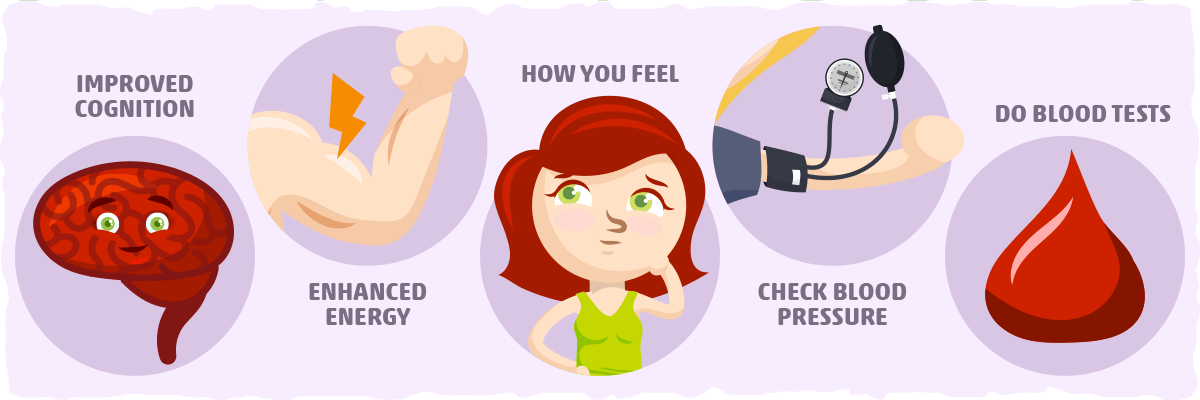
As with most diet changes, the keto diet will be difficult at first. However, after you get past the keto flu (flu-like symptoms that you may experience when you first adapt to severe carb restriction), you will begin to experience the benefits of keto dieting.
For example, studies have found that the keto diet can help improve cognitive function, enhance energy levels, and improve key biomarkers like cholesterol levels, blood sugar, triglycerides, and blood pressure. Dozens of keto success stories also report improved mood and sustained weight loss. However, this isn’t going to be the case for everyone.
Due to the major changes that keto elicits throughout the body and how remarkably different it is from typical dietary patterns, the keto diet might do just the opposite of what some of the research studies and success stories suggest.
So, how do you figure out if the keto diet is good for your overall health and well-being?
Firstly, check in with how you feel after following keto for a couple of months. When you think about sticking to this dietary pattern for another three months, six months, or 24 months, do you feel overwhelmed and deprived or excited and prepared?
If the keto diet is a constant uphill battle for you that requires endless amounts of willpower, then it is best to make lifestyle adjustments that can help you reach your goals without having to struggle so much. (The process of losing weight doesn’t have to be filled with suffering.)
Remember, the key to losing weight is not restricting carbs or being in ketosis; it is maintaining a calorie deficit. To help you do this, try making lifestyle adjustments that will help you naturally eat less with minimal effort. Some examples of changes you can make are
- use smaller plates
- remove all unhealthy foods from your house and never buy them again
- have healthy options readily available and make less healthy foods much harder to attain
- increase your activity levels throughout the day (e.g., use a standing desk, go for walks, do light stretches, take dance breaks)
- track your calorie intake with a calorie tracking apps
- have a healthy snack with you while you are on the road to keep you from stopping to purchase unhealthy food
- try skipping breakfast (intermittent fasting)
There are a plethora of lifestyle hacks that you can use to make losing weight easier for you. Implement the ones that fit best with your lifestyle and see if they help you reach your goals.
However, keep in mind that, even if you feel incredible and love your new dietary approach, there will still be the possibility that keto dieting is making some aspects of your health worse. This is where objective testing comes in to help verify if your diet is right for you.
By objective testing, I mean routine blood tests or any other tests that are relevant to your condition. With a routine blood test, for example, you will be able to see if the keto diet is helping or harming your cholesterol and triglyceride levels.
Although many studies have shown that keto can improve heart health, some people, particularly those who have familial hypercholesterolemia, can increase their risk for heart disease when they raise their overall fat intake. This is one reason why objective testing is such a crucial part of determining how healthy your diet is for you.
If you find that the high fat, low carb diet knocks your biomarkers out of whack, there is no need to worry. Try sticking to a whole food based diet like the Paleo diet or Mediterranean diet, and use the principles found throughout this article to help you maintain a calorie deficit and meet your micronutrient needs while you are also improving your overall health and well-being. (For those of you who would like to learn more about keto and how it affects cholesterol levels, check out our article on this topic for a closer look.)
Altogether, as long as you are getting the results you want, meeting your nutrient needs, feeling healthy, and your relevant biomarkers are looking good, then you are on a diet that is healthy for you. Well, at least it will be healthy for you in the short-term.
To turn your diet into your new way of life, you may need to make some other changes.
Long-term Keto Dieting — Turning Your Short-term Success into a New You
With the help of the previous three sections, you will be able to formulate a keto diet that works for you — in the short-term. By following those principles and suggestions, you will vastly increase your likelihood of getting the results you want in a healthy way.
However, one final hurdle still looms in the distance: maintaining your results, health, and well-being for the long-term. You may have been able to willpower your way to your ideal body, but do you think you can sustain this eating pattern indefinitely?
If the answer is no, then start planning for the future.

Begin thinking about how you can change your food environment, your lifestyle, and your eating habits so that you naturally follow a healthy diet without succumbing to your old, unhealthy eating habits.
There are many strategies you can use to help you make your healthy diet into your new way of life, including the lifestyle adjustments we learned about in the last section. All it takes is some experimentation, self-awareness, and the diet principles we explored earlier to find out what works best for you.
Key Takeaway — How to Know If Keto Is Healthy or Harmful for You
The ketogenic diet can help treat certain conditions and accelerate weight loss in a healthy way, but it can also be harmful and hard to follow.
To ensure that your keto diet is healthy and effective, follow these four healthy diet principles:
- Eat the right amount of calories and protein to meet your goals.
- Get most of your calories from micronutrient dense foods.
- Make sure your diet is improving your overall health and wellbeing subjectively and objectively.
- Implement lifestyle adjustments to make your diet into a long-term lifestyle that you can follow indefinitely.
By implementing these four principles and making the appropriate adjustments, you will be well on your way to formulating a diet that is healthy for you now and in the years to come. If you think that keto is the diet you are looking for after reading this article, I recommend checking out our guide on how to start the keto diet.
Sources:
- How to Lose Weight on a Ketogenic Diet — Ruled.me
- Ketogenic diet: Is the ultimate low-carb diet good for you? — Harvard Medical School
- Prevalence of micronutrient deficiency in popular diet plans — NCBI
- The Hungry Brain — STEPHAN J GUYENET, PhD
- Obesity Energetics: Body Weight Regulation and the Effects of Diet Composition. — NCBI
- Effects of low-carbohydrate vs low-fat diets on weight loss and cardiovascular risk factors: a meta-analysis of randomized controlled trials — NCBI Bookshelf
- Very-low-carbohydrate ketogenic diet v. low-fat diet for long-term weight loss: a meta-analysis of randomised controlled trials — British Journal of Nutrition
- Twelve-month outcomes of a randomized trial of a moderate-carbohydrate versus very low-carbohydrate diet in overweight adults with type 2 diabetes mellitus or prediabetes — Nutrition & Diabetes
- Long-term effects of a ketogenic diet in obese patients — NCBI